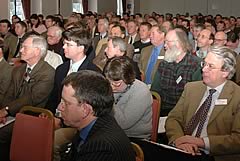Jennifer MacKenzie is an agricultural photo journalist with almost 30 year's experience. Operating from her base in Cumbria, Jennifer undertakes mainly industry-related freelance writing and photography.
TAG conference 2005
 |
The Arable Group’s (TAG) 2005 biannual conference on Wednesday (February 9) at the Scotch Corner Hotel, dedicated to questioning the implications of the Mid Term Review changes for arable farmers, was attended by 170 delegates – 80 per cent of which were farmers. It was chaired by Julian Cook, NatWest’s regional agricultural manager.
The Arable Group is a unique trials organisation operating 24 centres, funded predominantly by farmer subscriptions, providing independent, agronomic information to progressive arable farmers, using information derived from the largest network of agronomic trials in the country.
The board of TAG consists of farmers and within each region local technical committees guide the trials work of each centre assisting the board in making The Arable Group the most successful agronomic trials and advisory organisation in the UK.
Speakers:Farmer controlled businesses – as opposed to farmer co-operatives – were the way forward for arable producers to get a bigger slice of the profits from the food chain, Cranfield School of Management economist Sean Rickard told the conference.
Matthew Currie, partner of Smiths Gore based in Dumfries, reminded arable producers at the conference that change is inevitable – progress is not.
Despite the arable industry facing challenging times, real economies can be made, especially in the area of fixed costs, TAG’s machinery consultant John Bailey told the conference.
With pending reductions to the Single Farm Payment, arable producers would have to seek more returns from the market in future, Alastair Dickie, crop marketing director of HGCA told the conference.
An arable farm supporting two families would need to make a £50,000 net profit to meet their drawings, Richard Crane, of accountants Deloitte and Touche told the conference.

